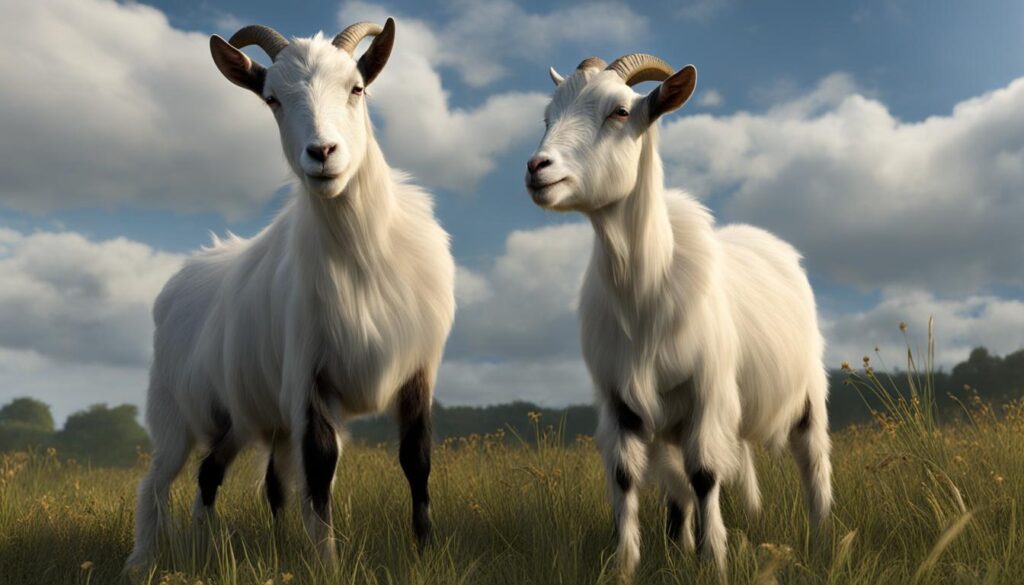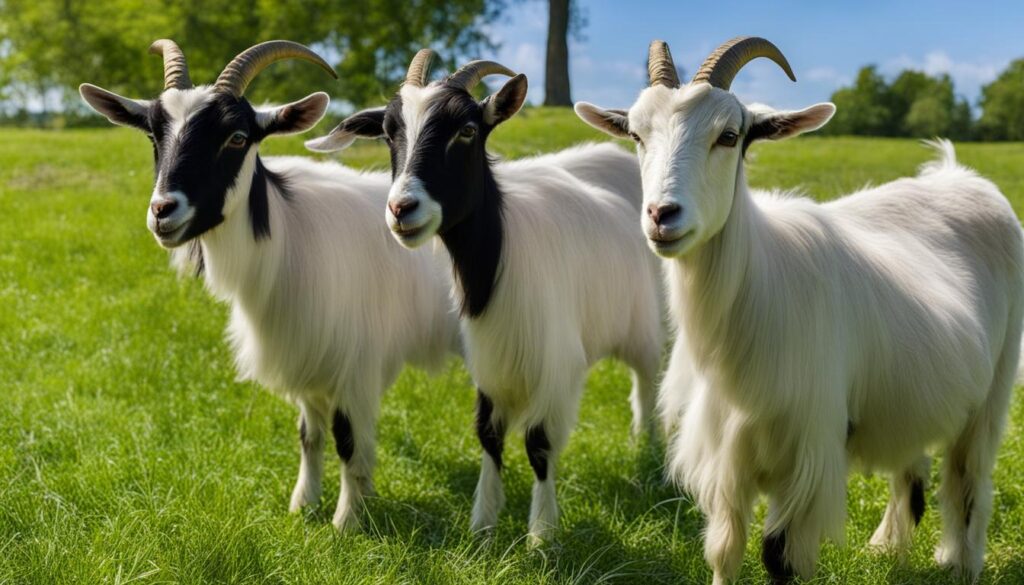As a hobby farmer with a passion for backyard goat breeding, I’ve witnessed firsthand the allure and pitfalls of raising these charismatic animals. It’s a common scenario where one may wonder about the genetic risks of sibling mating, particularly in the tight-knit quarters of small-scale farming. Exploring the depths of goat breeding consequences, my experience compels me to share the facts that every backyard breeder should know.
The intricate dance of genetics is not to be taken lightly, and I feel an immense responsibility to shed light on these issues. Understanding the biology and potential repercussions behind close-knit breeding practices is crucial for the health and vitality of any goat herd, and by diving into these topics, we arm ourselves with the knowledge to make informed, conscientious decisions. In my journey, I’ve encountered numerous outcomes, both desirable and worrisome, that arise when goat siblings mate. These stories are not just tales from the barn but lessons in the science of life.
Key Takeaways
- Recognize the potential for genetic risks when goat siblings mate within a backyard breeding setup.
- Identify the consequences of close breeding practices on herd health.
- Learn the importance of genetic diversity for maintaining a resilient goat population.
- Discover strategies to avoid negative outcomes of sibling mating in goat herds.
- Gain insights into practical experiences of small-scale goat farmers managing breeding responsibly.
- Embrace informed decision-making processes for ethical and sustainable breeding endeavors.
Understanding Goat Breeding Practices
As a seasoned hobby farmer, I’ve witnessed firsthand the importance of responsible goat breeding, vital to the success of small-scale goat reproduction and overall farm vitality. It’s about more than just putting two goats together; it requires an understanding of genetics, animal behavior, and seasonal patterns to conduct backyard goat farming effectively.
Selecting compatible mates plays a crucial role in a successful breeding program. Goats are selective creatures, and their compatibility can greatly affect fertility rates and offspring quality. I observe my herd’s behavioral cues and preferences, ensuring the chosen pairs have the best chance of successful mating. Moreover, I closely monitor their health and genetics to prevent potential future complications.
Timing is another critical aspect when it comes to breeding goats. Aligning the breeding season with nature ensures that kidding occurs when resources are abundant and conditions are favorable. This synchronicity leads to healthier kids and an easier time for the dam. To spot the signs of a successful mating, I look for changes in behavior, such as reduced vocalization and restlessness in does, while bucks show less interest in pursuing the females.
Providing the right environment and care during the breeding season lays a strong foundation for the health of the kids and the herd overall.
- Regular health checks to prevent the spread of communicable diseases.
- Isolating new animals before introducing them to the herd to maintain biosecurity.
- Detailed record-keeping to track breeding results and make informed decisions.
Responsible breeding practices don’t just happen in the field; they’re also about diligent record-keeping and staying informed through resources like local farming groups and veterinary advice. Maintaining a diverse gene pool is key to backyard goat farming, and every decision I make is geared towards sustainability and animal welfare. Remember, responsible breeding isn’t just about today’s success—it secures the health and productivity of your goat herd for generations to come.
Genetic Implications of Inbreeding in Goats
As I delve into the complexities of goat breeding, it’s essential to clarify the inbreeding definition within the context of goat genetics. Inbreeding occurs when closely related goats, such as siblings, mate. While it may intensify certain desirable traits, it can also amplify the risk of genetic defects in goats. On the flip side, linebreeding in goats is a more controlled technique, aiming to maintain and enhance specific genetic qualities without the close mating of immediate relatives. Both methods carry implications for the vitality of the herd.
The Meaning of Inbreeding and Linebreeding
Inbreeding is often a subject of concern among hobby farmers, with questions such as “can goats mate with siblings?” or “can goat cousins breed?” arising frequently. Linebreeding, a form of inbreeding with a focus on less immediate relatives, has been used strategically to preserve a diverse goat gene pool while enhancing certain traits.
Potential Genetic Defacts and Health Issues
The risks associated with inbreeding cannot be overstated; health issues from inbreeding may include a variety of genetic defects and reproductive challenges. The following table outlines some of the common problems hobby farmers might encounter:
| Genetic Defect | Consequence | Prevalence in Inbred Populations |
|---|---|---|
| Reduced fertility | Lower birth rates | Higher |
| Congenital abnormalities | Potential for increased offspring mortality | Increased risk |
| Compromised immune functions | Susceptibility to illnesses and infections | More common |
Managing the Goat Gene Pool: Hobby Farmer Strategies
In answer to these challenges, a responsible breeder must adopt effective breeding strategies to ensure a robust herd. Introducing new bloodlines and maintaining meticulous breeding records are just a couple of the tactics I use to prevent the detrimental effects of inbreeding among my goats. Moreover, consulting with goat associations for guidelines ensures ethical and healthy breeding practices.
What Happens if Goat Siblings Mate
As a hobby farmer, I’m often asked if you can breed brother and sister goats and what the sibling mating outcomes might be. The risks of sibling goats breeding are a subject of great concern and are worth examining closely. I aim to guide peers through the potential biological repercussions this practice may introduce to their herds.
Inbreeding depression is a term frequently mentioned in the context of any close breeding, including goat siblings mating with each other. The term refers to the reduced biological fitness in a given population due to inbreeding, which may result in an increased presence of deleterious genes. When brother and sister goats mate, the chances that their offspring will inherit such genes is significantly higher.

Another concern comes from the genetic diversity standpoint. A diverse gene pool is typically a sign of a healthy and resilient herd, while a uniform gene pool can make the goats more susceptible to diseases or genetic disorders that can be devastating over several generations.
- Hereditary Diseases: These diseases can become more prevalent with each successive generation of sibling mating, including those not commonly seen in a well-diversified herd.
- Fertility Issues: Offspring of sibling goats might experience a higher rate of infertility, which could eventually lead to difficulties in sustaining a herd’s population.
- Growth and Development: There’s a risk that inbreeding might lead to goats that do not develop as well or as quickly as their counterparts from a varied genetic background.
Experts including geneticists and seasoned goat breeders suggest careful screening and selective breeding as key approaches to mitigate these risks. They advocate for breeding strategies that not only produce hardy goats but also support a genetically diverse and sustainable herd.
All this considered, effective breeding requires thought, care, and a bit of scientific intervention. My advice? Utilize available genetic data to make informed decisions, as it’s not only the today of your herd that depends on it, but the tomorrows too.
Navigating the Ethics of Breeding Brother and Sister Goats
As we delve into the ethics of animal breeding, particularly the breeding of sibling goats, we enter a realm that requires a careful balance between the biological implications and the moral responsibilities. To start, let’s consider the multifaceted nature of ethical decision-making in the context of hobby farming.
Ethical Considerations in Animal Breeding
Issues surrounding sibling goats breeding touch upon a spectrum of ethical dilemmas. It’s vital to understand that ethical animal breeding is about more than just genetics; it’s about respect for the animals and the wider implications for their wellbeing. Discussions in this area often revolve around the notion of consent and the intrinsic value of an animal’s life.
Engaging in breeding ethics means making informed choices that prioritize the welfare of the animals and the integrity of the species. Compassion, not just compliance, should guide our decisions in this space.
When addressing sibling goats ethical dilemmas, we must acknowledge the fine line between natural behavior and human-imposed breeding. These considerations extend beyond the immediate scope of our farms and speak to the broader societal values we wish to uphold.
The Hobby Farmer’s Responsibility: Welfare and Best Practices
Hobby farming responsibilities are numerous, especially when it comes to the animal welfare in breeding. Each decision made impacts not only the current generation but sets the precedence for the future handling of these beloved creatures.
Committing to best breeding practices necessitates a dedication to continuous learning and adaptation. Let’s outline some of these practices:
- Maintain thorough breeding records to assist in making informed pairing choices and to prevent inadvertent inbreeding.
- Introduce new bloodlines responsibly, ensuring genetic diversity and vigor within the herd.
- Utilize health screenings and genetic tests to make informed breeding decisions, seeking to minimize the risk of heritable conditions.
- Participate in educational workshops and collaborate with local farming communities and animal welfare organizations for support and guidance.
With the power of knowledge and ethical consideration, hobby farmers can lead the way in ethical animal breeding, propagating not just healthy herds, but a legacy of respect and care for the animals they nurture.

In conclusion, upholding ethical standards in goat breeding is a task that combines the art of animal husbandry with the heart of stewardship. Navigating these ethics is a journey, and as a hobby farmer, I am committed to ensuring that every step taken is done with a deep sense of responsibility and care for the welfare of my animals.
Alternatives to Mating Goat Siblings: Long-term Solutions
In my journey as a hobby farmer, I’ve witnessed the necessity for sustainable goat breeding practices. It’s imperative that we explore alternative breeding solutions that both augment herd health and bolster sustainability. Preventing inbreeding is not only a matter of promoting genetic diversity but also a commitment to the welfare and longevity of our goat herds. Bringing in an unrelated buck from a different farm injects new genetic material into the bloodline, offering a straightforward and effective way to avert the perils of close kin mating.
Another innovative approach that I have found valuable is the implementation of artificial insemination (AI). AI allows for greater control over the genetic input and can be an essential tool in preventing inbreeding. By utilizing semen from genetically diverse and superior bucks, the method serves not only to enhance the quality of offspring but also to impede the transmission of undesired traits. It’s a technique that, although requiring an initial learning curve, has vast potential in shaping a hearty and healthy future for the herd.
My experiences have led me to appreciate that intentional, informed decisions in breeding are the key to achieving a thriving goat population. By employing these alternative methods, we equip ourselves with the power to enrich our practices and support the development of robust goats. It’s a pathway that aligns ethical consideration with practical action, assuring a prosperous continuation of our cherished backyard farming endeavors.
